- Home
- Simon Kernick
Dead Man's Gift 02 - Last Night Page 4
Dead Man's Gift 02 - Last Night Read online
Page 4
‘You don’t talk much, do you?’ said Orla. She had Scope’s laptop on her lap, which was connected to the tracking device under Bale’s car, and she seemed happy to be helping him.
He shrugged. ‘I only talk when I’ve got something to say.’
‘And you’ve got nothing to say to me? Are you still pissed off about what happened with Tim?’
‘You did a bad thing.’
‘I didn’t force him to sleep with me, you know. He chose to. It’s not my fault he’s a philandering arsehole.’
‘I wouldn’t deny that,’ said Scope, looking out the window.
‘So why are you helping him?’
‘Let’s just say I’ve got a connection to the family.’
Out of the corner of his eye, Scope could see her looking at him, wanting to get his attention. He ignored her. He had no desire for small talk, not with everything else that was going on, but as he sat staring out at the street, watching it begin to fill up with school kids and the next wave of commuters, he heard Orla sobbing quietly. With a sigh he turned towards her. ‘What’s wrong?’
‘I just can’t believe that Phil tried to kill me. I can’t believe my life – everything – is so fucked up.’
‘You can change it, you know,’ he told her. ‘You’re young. You’re pretty. You’re not stupid. That’s usually considered a winning combination.’
‘But how? I’m caught up in something really big, and Phil’s lying dead in my flat.’
For a moment, she looked like a terrified young girl. It might have been an act, but somehow Scope doubted it.
‘You don’t have to stick with me,’ he said. ‘Go to the police. Tell them the truth. Phil tried to kill you; a stranger intervened; you ran away. I’d appreciate it if you didn’t tell them too much about me, of course. But the point is, you can sort this.’
‘I just want to be happy, that’s all,’ she said, shaking her head as if even the thought of happiness was pointless. ‘I didn’t want to end up like this.’
‘And you don’t have to. Make a fresh start away from here. Take a TEFL course or something. Go and teach kids English in some far-flung country where you can feel the sun on your back.’
‘I don’t have the money.’
‘Then earn it. Get a job. Save up. You can do anything if you try. Remember that.’
She smiled a little and put a hand on Scope’s arm, giving it a squeeze. ‘Maybe I will. Thanks. You’re a nice guy.’
Scope knew she’d never do it. He could see it in her eyes. She was the kind of girl who was used to fooling men and telling them what they wanted to hear. Fair enough. It wasn’t his problem.
The laptop on Orla’s lap bleeped loudly. Frank Bale’s car was on the move.
‘Right, time to go,’ he said, switching on the engine and pulling out into the road.
‘What are you going to do when you catch up with him?’
It was a good question. ‘We’re going to follow him and see where he heads.’
‘You think he might lead us to Tim’s son?’
‘I don’t know, but there aren’t going to be many people involved in this, and he’s probably the most senior, so he’s going to know where Max is. If we get close to him and I get the chance I’m going to speak to him.’
But getting close to him proved to be impossible. Central London rush hour was in full swing, and it took them a full five minutes to get onto the A404. According to the tracker, Bale was heading south and was roughly eight hundred metres in front of them.
For the next twenty minutes Scope weaved in and out of the traffic, getting steadily closer to Bale’s Jaguar as it turned onto the North Circular, heading down through Hangar Lane and then onto Ealing Broadway until it was only fifty metres ahead of them. There were still far too many cars and pedestrians to even think about intercepting him, but it didn’t matter to Scope so long as he kept Bale in his sights. He’d wait until a suitable opportunity to make a move presented himself, then he’d go in hard. There’d be no niceties. He would make Bale take him to where they were holding Max. After that, he wasn’t sure what he’d do.
‘He’s turning left,’ said Orla, looking up from the laptop screen and craning her neck so she could see past the single line of slow-moving traffic ahead of them. Scope did the same thing and saw the Jaguar pull into the front car park of a large, shabby-looking building straight out of the school of crap 1960s architecture.
It was another minute before they drew level with it, and Scope cursed when he saw that the building was Ealing police station and that Bale’s car, and Bale himself, were nowhere to be seen.
‘Shit,’ said Orla. ‘What now?’
Scope carried on driving, before pulling into a residential street fifty metres past the station and parking illegally halfway up on the pavement. He was about to answer when the phone rang in his pocket.
It was Tim Horton, and the time was 8.53 a.m. This time instinct told Scope to answer.
‘Are you free to talk?’ he asked, putting the phone to his ear.
‘Yes, but not for long. They’re monitoring me.’
‘I’ve located the man I think may be masterminding this, but I can’t talk to him at the moment. He’s just gone inside a police station.’
‘Voluntarily?’
‘Yeah, he’s a cop.’
‘You’re joking?’
‘I don’t joke in these situations.’
‘Jesus. The bastard.’ He sighed. ‘I’ve just had a recorded message from Max on my phone. He’s definitely alive, Scope. But time’s running out. I’m on my way into Parliament, and I’m wearing a suicide vest. They’re going to make me use it in the hearing at eleven. I’ve got two hours, Scope,’ he continued, his voice cracking under the strain. ‘After that it’s all over.’
Scope’s hands tightened on the steering wheel. This was worse than he’d thought. ‘I know it’s hard, but try not to panic. It won’t help.’
‘That’s easy for you to say.’
‘I’ve been in life-threatening situations before, remember. Just like the one you’re in now. And I’m going to get you out of this one. Are you meant to detonate it yourself?’
Orla’s eyes widened when she heard this, but Scope gave her a look that said keep quiet.
‘No,’ said Tim, ‘that’s the thing. The detonator’s hidden in the gents’ toilets after the metal detectors. I’ve just been told to put it in the vest. I think they’re going to detonate it by mobile phone.’
‘Don’t pick up the detonator. You might set it off prematurely and the minute you’re wearing it, you’ve got no control over what happens to you.’
Tim let out a hollow laugh. ‘I haven’t had any control over anything for the last eighteen hours. But how are you going to stop this?’
‘You’ll just have to trust me.’
There was a long pause at the other end. ‘I’ve got to go now. But tell me … Is Orla okay?’
Jesus, thought Scope, he really must be smitten to worry about her when he potentially had two hours to live. ‘Yeah,’ he said. ‘She’s fine. Now remember, don’t wear that thing. I’ll sort this out.’
Tim ended the call without answering, and Scope replaced the phone in his pocket.
‘So, what are they going to make him do?’ asked Orla.
‘You don’t want to know,’ said Scope and pulled away from the kerb as a blue-capped traffic warden approached. Right now, Frank Bale was untouchable, and would be until he left the police station.
And with just over two hours to go until the hearing started, Scope was going to have to think of something fast.
17
It was 10 a.m. and Ealing cop shop was like a furnace. Someone had turned the thermostat up to tropical rainforest setting and Frank Bale, who felt the heat at the best of times, was sweating like a pregnant nun. He’d just had a meeting with the SIO of the local murder squad who were investigating the sexually motivated killing of an eleven-year-old girl in her home, in what appeared to b
e a burglary gone wrong. The inquiry had ground to a halt and the powers-that-be were considering getting Frank’s unit involved to try to get things moving again. And, after the meeting that Frank had just had, it was clear his expertise was needed. The local SIO was out of his depth, and you couldn’t have that in a case like this. Child killings – particularly those involving strangers – always created a lot of heat, which, Frank thought, was ironic under the current circumstances. He didn’t have any kids himself. A low sperm count had put paid to that. His wife had been disappointed. Frank hadn’t. He’d never liked them.
Even so, he got no pleasure from what was happening to Max Horton. Nor what was going to happen in a few hours’ time, because the thing was, there was no way he could be released. Kids had good recall, and under questioning from trained police officers, Horton junior would almost certainly be able to throw up a few decent leads, however careful his kidnappers had been. And Frank couldn’t afford that. He’d originally tasked Phil Vermont with killing him and disposing of his corpse, knowing that an amoral lowlife like him would have no problem with it, as long as the money was right. Now that he was dead, Frank was going to have to rely on Celia to do it, although from the sounds of her, she wasn’t going to have any problem either. Either way, Frank wanted to avoid getting blood on his own hands.
As he walked back to his car, he flapped open his suit jacket to let the frigid air cool him. In truth, he felt uneasy. He didn’t like the fact that this guy Scope was running round looking for him. He remembered the name from the siege at the Stanhope Hotel two years earlier. Scope had performed a few heroics and taken out a couple of terrorists Bruce Willis-style, just like he’d taken out Phil Vermont. Frank was pretty sure Scope wouldn’t be able to find him, but he wasn’t taking any chances. In the Jag’s glove compartment was a short-barrelled 9mm pistol with a suppressor attached – a gift from his boss, in case of emergencies. He reached over and got it out now, fitting it to a shoulder holster underneath his jacket, before pulling out of his parking space.
It was time to do his good deed of the day.
18
They’d been driving round in circles waiting for Frank Bale to make his move for the past hour. Scope had told Orla what the kidnappers wanted Tim Horton to do – in the end, he’d seen no reason not to – and it was obvious that the knowledge of what she was a part of had come as a huge shock, because she’d been largely silent ever since.
Scope was a patient man. It was a virtue he’d learned in the army, where there was always a great deal more watching and waiting than there ever was actual fighting, but even so the pressure was beginning to tell. If Frank Bale didn’t come out of the police station soon, then he was going to have to get inside the building somehow.
But how? He wasn’t Superman. There was only so much he could do. If the bomb was going to be detonated remotely by mobile phone, then he was sure that Bale would be the man detonating it. The huge problem was that he could do this anywhere. All it took was a phone call to the handset attached to the bomb and it would set the thing off.
The laptop bleeped.
‘The car’s moving,’ said Orla excitedly. ‘He’s turning onto Uxbridge Road, heading east back towards Hangar Lane.’
Scope was on a back street parallel to the main road but the wrong side of the police station. He did a quick U-turn, overtook a car moving slowly ahead of him, and two minutes later he was back on the Uxbridge Road. This time he was far less subtle in his driving, overtaking two cars in front and having to cut back in fast to avoid a van coming the other way.
‘Slow down. He’s only fifty metres ahead. He’ll see us.’
Scope forced himself to drop the pace as they drove past Ealing Common, keeping well back, aware that he could blow this very easily, but even more aware of the clock on the dashboard telling him it was 10.20 a.m. He had the Jaguar in his sights a dozen cars in front, but at the North Circular junction traffic lights Bale got through and Scope didn’t.
Within five minutes, though, Scope was back within a dozen cars of him as they passed through the Hangar Lane junction. The problem was there were still far too many people about for Scope to do anything without drawing attention to himself, and the traffic was moving too quickly for him to jump inside the Jaguar even if he was prepared to take that risk.
Bale temporarily disappeared from view as Scope came to a halt behind a lorry.
‘Okay, he’s turning right up ahead,’ announced Orla, still staring at the screen. ‘He’s turned.’
Scope stuck his nose out behind the lorry, but there was no way through and he was forced to wait until the traffic started moving again.
‘Okay, right down here,’ she said, pointing at a turning into a residential street on the other side of the road.
Scope pulled into the middle of the road but was forced to wait precious seconds for a big enough gap in the oncoming cars before he pulled across in a screech of tyres. There was no sign of the Jaguar, but Orla was doing a good job of telling Scope which route to follow, making him glad that he’d brought her.
‘You’re on the road parallel to him now,’ she said, ‘and we’re almost level. There’s a junction up ahead. Turn left there and we can cut him off.’
The street – two long rows of 1950s terraces – was quiet, and there was no traffic up ahead, so Scope accelerated, the dial picking up towards fifty. A young Asian woman pushing a pram gave him an angry look and gestured for him to slow down, but he ignored her. The dashboard clock said 10.28.
The junction loomed up ahead and Scope slammed on the brakes before yanking the wheel hard left and almost hitting a dustcart sitting in the middle of the road. The car squealed to a halt just behind it and two dustmen unloading rubbish into the back both turned and scowled at him. There was no way past them as the dustcart crawled further along the road, and Scope’s only hope was that it would block the road that Frank Bale was travelling down and force him to a halt.
Except it didn’t. Up ahead, Scope saw the Jaguar pull up at the junction and dart across in front of the dustcart.
He cursed, slamming his fist down on the horn, hoping he could speed it up. But still it crawled slowly forward as the various bins were collected.
A gap finally appeared as the dustcart approached the junction from which the Jaguar had emerged, and Scope yanked the wheel and mounted the pavement, almost knocking over two of the binmen as he got in front of the dustcart and accelerated up the road.
‘Where’s he now?’ he demanded.
‘He’s about four hundred metres up ahead and …’ Orla paused. ‘Looks like he’s slowing down.’ Another pause. ‘He’s stopped.’
‘Where?’
Her expression was puzzled. ‘Looks like the Central Middlesex Hospital.’
‘Are you all right, Tim?’ asked Brenda Foxley, a tough-looking yet kindly MP from the Labour back benches, who served on the committee with him. ‘You haven’t been yourself today.’
It had just turned 10.30 a.m. and they were walking down the corridor towards the Portcullis Room, where the hearing was to take place, the remainder of the committee and the attendant researchers following in a loose line behind them as they passed through the metal detectors.
Tim forced a smile. He liked Brenda, having known her close to ten years now. They’d even had a brief fling once, not long after Max had been born, and she’d be sitting next to him today. Which meant that unless Scope came up with something very fast, she’d be dead too within the next half an hour. ‘I’m fine. I’ve just been a bit under the weather lately, that’s all. I think I might be coming down with flu.’
‘Don’t give it to me then. I’m off to Malaysia next week on that fact-finding tour, and I don’t want to miss out on the chance of sunshine.’
‘Don’t worry,’ he said, unable to keep the smile going. ‘I don’t think it’s catching.’
The men’s toilets were coming up on the left and Horton excused himself, walking up to the third cubicle, his hear
t hammering in his chest. The door was slightly ajar and he went inside, locking it behind him. One of the other cubicles was occupied by someone who was making a lot of noise clearing his throat, and Horton wondered whether he too was going to be attending the hearing.
He bent down and reached round the back of the toilet bowl, immediately feeling the mobile. It was affixed to the bowl with duct tape, and he slowly peeled it off before gingerly placing the unit on the toilet seat. It didn’t consist of much. Part of the mobile’s casing had been removed and two wires – one black, one red – ran from its circuit board directly into a thin, mobile-phone-sized block of plastic explosive wrapped in protective film. The whole thing was held together by a single tightened canvas strap.
Horton stared at it for a long time. It wouldn’t have been difficult for someone who knew what they were doing to get the various components through the metal detectors before assembling it in here, but it was still a terrifying thought that determined individuals could bring such weaponry into the mother of all Parliaments. It looked so innocuous as well, but he knew the damage it would do. The phone vibration would set off the first explosion, which would set off the bigger package of plastic explosives in the vest’s lower pocket, and blow the hearing room to smithereens. He’d be killed instantly. No question.
He looked at his phone, hoping he’d missed a call from Scope, but he hadn’t. This was the moment of truth. If he put the bomb in the vest, he’d be a dead man walking, with no control over his destiny. But if he didn’t and Scope failed, then Max died, and he’d have to live with the guilt for the rest of his life.
The man in the other stall farted loudly and Horton shut his eyes tightly. He had no choice. In the end, he had no choice.
Pulling up his shirt, he slipped the bomb inside the empty pocket.

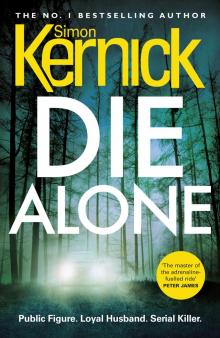 Die Alone
Die Alone Deadline
Deadline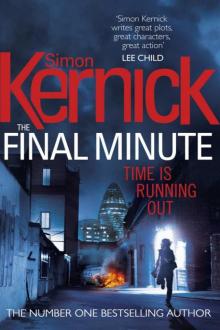 The Final Minute
The Final Minute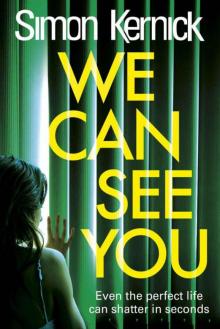 We Can See You
We Can See You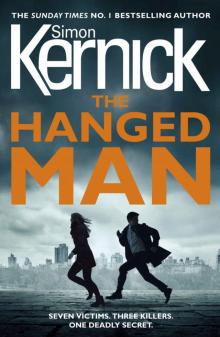 The Hanged Man (Bone Field 2)
The Hanged Man (Bone Field 2)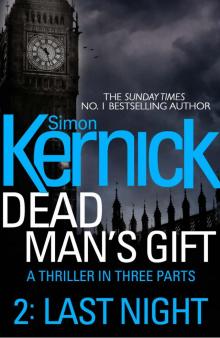 Dead Man's Gift 02 - Last Night
Dead Man's Gift 02 - Last Night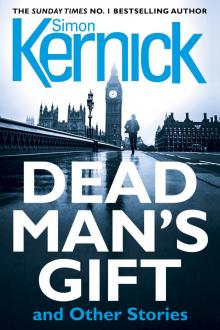 Dead Man's Gift and Other Stories
Dead Man's Gift and Other Stories A Good Day To Die
A Good Day To Die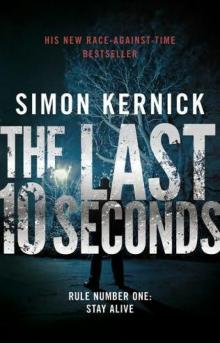 The Last 10 Seconds
The Last 10 Seconds The Murder Exchange
The Murder Exchange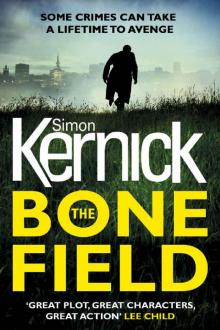 The Bone Field
The Bone Field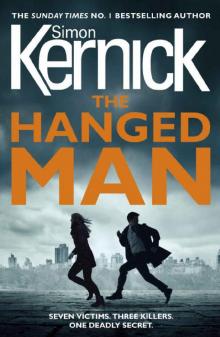 The Hanged Man
The Hanged Man Target
Target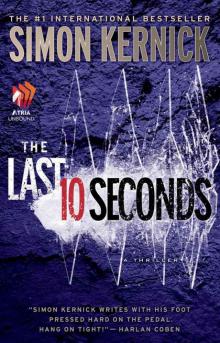 The Last 10 Seconds: A Novel
The Last 10 Seconds: A Novel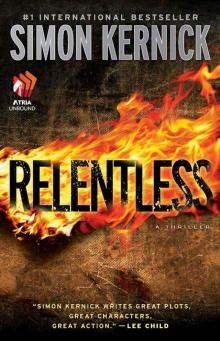 Relentless: A Novel
Relentless: A Novel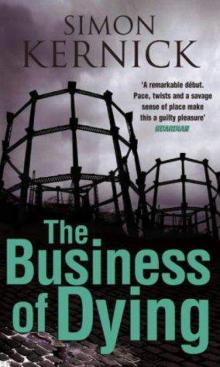 The Business Of Dying
The Business Of Dying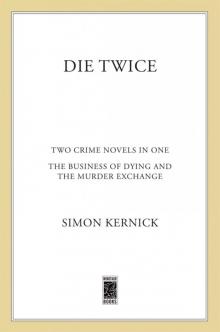 Die Twice
Die Twice Flytrap
Flytrap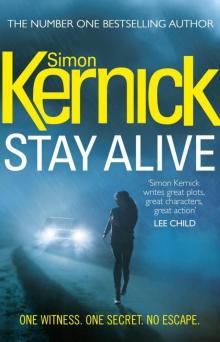 Stay Alive
Stay Alive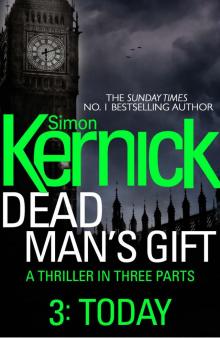 Dead Man's Gift 03 - Today
Dead Man's Gift 03 - Today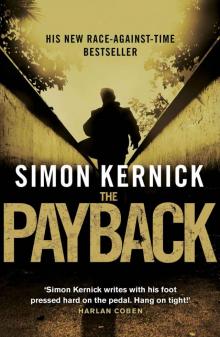 The Payback
The Payback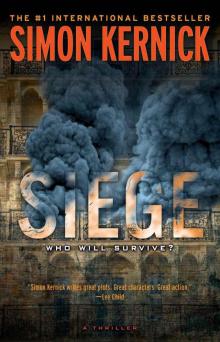 Siege: A Thriller
Siege: A Thriller The Crime Trade
The Crime Trade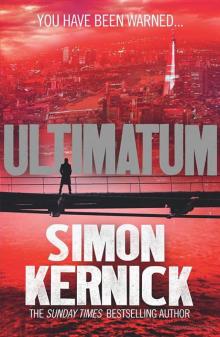 Ultimatum
Ultimatum